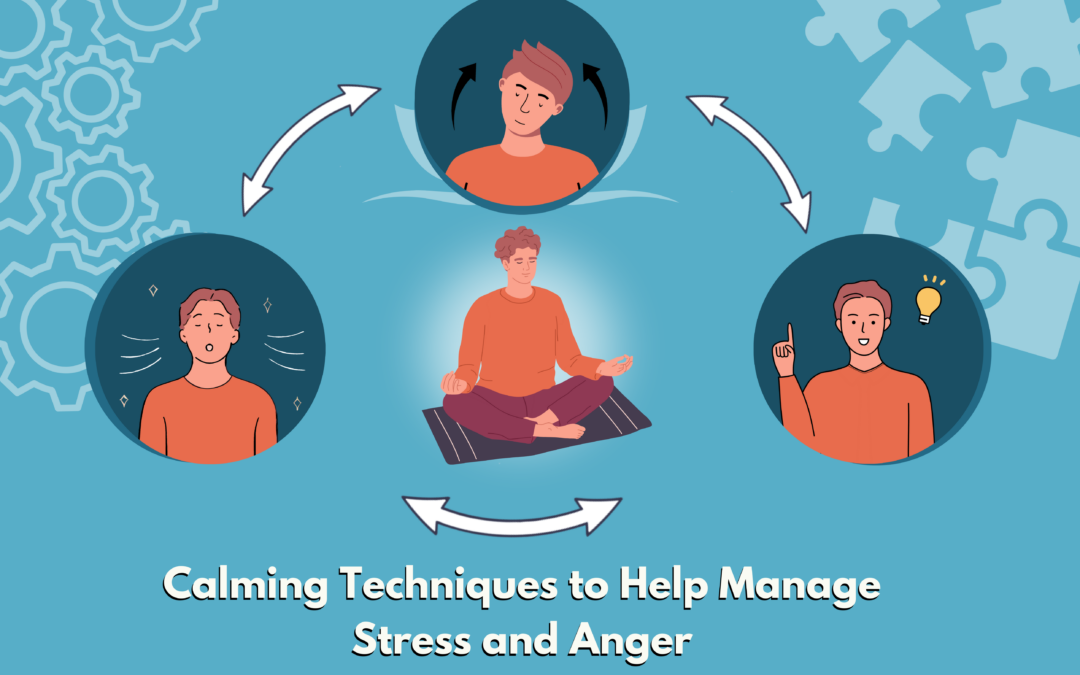Manage Your Stress and Anger
Effective stress and anger management is crucial for maintaining mental health and enhancing your quality of life. Both stress and anger can escalate quickly, impacting personal and professional relationships adversely. Through my experience working with clients in psychotherapy, I have developed targeted strategies that help individuals regain control over their emotional responses. This guide delves into three of these techniques: deep breathing, progressive muscle relaxation (PMR), and cognitive restructuring. Each method is designed to provide both immediate relief and foster more long-term emotional resilience.
Deep Breathing To Reduce Stress and Relieve Anger
Deep breathing is a basic yet profoundly effective method to counteract the physiological responses triggered by both stress and anger. When stressed or angered, the body’s sympathetic nervous system initiates a fight-or-flight response, characterized by an increased heart rate, faster breathing, and elevated blood pressure. Deep breathing exercises engage the parasympathetic nervous system, the body’s natural relaxation response, which helps reduce these reactions and promote a sense of calm.
Steps To Utilize Deep Breathing:
- Find a quiet, comfortable place to sit or lie down.
- Close your eyes to reduce external distractions.
- Slowly inhale through your nose, ensuring your chest and lower belly rise, filling your lungs completely.
- Hold this breath for a count of three
- Exhale slowly through your mouth, relaxing muscles in your face, jaw, shoulders, and stomach.
- Continue this cycle for several minutes, focusing solely on the rhythm of your breath.
This technique is particularly helpful because it can be employed anytime and anywhere, providing a practical tool for immediate stress and anger management. In my psychotherapy practice, I guide clients through this process, helping them temporarily distance themselves from their immediate stressors.
Progressive Muscle Relaxation (PMR) for Stress and Anger Management
Progressive Muscle Relaxation is another useful method that helps relieve the physical tension that often accompanies stress and anger. Developed by Dr. Edmund Jacobson in the early 20th century, PMR involves sequentially tensing and then relaxing specific muscle groups throughout the body. This practice not only helps reduce physical tension but it also decreases mental agitation in the process since the body and mind are interconnected.
Steps to Utilize PMR:
- Begin in a comfortable seated or lying position.
- Tense the muscles in your feet and toes as tightly as possible for about five seconds, then relax them for 10 seconds, noticing the sensation that accompanies their release.
- Gradually move through each muscle group—legs, abdomen, chest, arms, and finally the face. Follow the same pattern of tensing and relaxing.
- With each cycle of relaxation, visualize the stress and anger flowing out of your muscles and dissipating into the air.
Regular practice of PMR can significantly decrease overall stress levels and is particularly useful before stressful events, or in response to situations that trigger either stress or anger. The PMR technique has been helpful for my work in various therapeutic settings, from intensive residential care facilities to outpatient clinics, as it can help clients achieve a marked reduction in their stress and anger levels.
Cognitive Restructuring to Lower Stress and Control Anger
Cognitive restructuring is a core component of cognitive-behavioral therapy, or CBT, which has proven invaluable in managing stress and anger. This technique involves identifying negative thoughts that fuel uncomfortable emotions, challenging their validity, and then replacing them with more balanced and constructive thoughts.
Steps to Utilize Cognitive Restructuring:
- To begin, identify the specific thoughts that arise during moments of stress or anger. These might include catastrophic predictions, personalizations, or all-or-nothing thinking.
- Systematically challenge these thoughts by questioning their accuracy and logic. For example, ask yourself, “Is there concrete evidence for this thought? What are the chances of this worst-case scenario actually happening?”
- Replace negative or distorted thoughts with more realistic and rational ones. For example, change “Everything always goes wrong” to “Sometimes challenges arise, but I have the skills and resources to manage them.”
This approach not only diminishes the intensity of stress and anger in the moment but also helps in altering underlying thought patterns that contribute to these emotions. In my experience as a therapist, I have seen that a consistent practice of cognitive restructuring helps clients learn that, while they cannot control every external event, they can control their reactions by adjusting their thought processes.
To Finalize Your Path to Stress and Anger Management
Deep breathing, progressive muscle relaxation, and cognitive restructuring are all helpful techniques in managing stress and anger. Each offers a unique approach to calming the mind and body, helping you manage emotional challenges more effectively. By integrating these methods into daily routines, you will not only be better able to cope with immediate stressors but also have a greater ability to build long-term emotional resilience. Each of these techniques serves as a robust tool that can help clients achieve greater emotional balance and well-being. With dedicated practice, these techniques can transform your ability to manage stress and anger, leading to improved relationships, better quality of life, and enhanced overall health.
Take Control of Your Emotional Well-being Today
Ready to unlock your full potential and embrace a life of emotional harmony and success? Start your journey to effective stress and anger management now! By helping with a number of proven therapeutic techniques, I’ll lead you to experience a transformative shift in your mindset and behavior, paving the way for enhanced productivity, stronger relationships, and enhanced well-being.
Don’t let stress and anger hold you back from living your best life. Empower yourself with the tools and techniques you need to establish a happier, healthier you.


Recent Comments